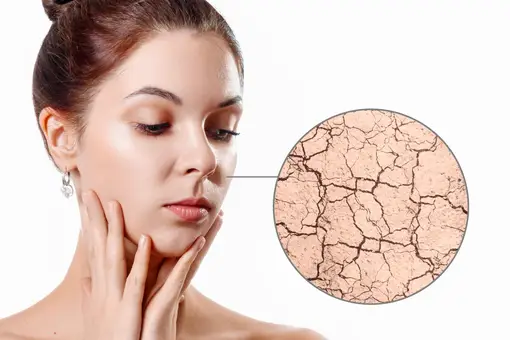6 Benefits & Uses Of Omega 3 For Skin

6 Benefits & Uses Of Omega 3 For Skin
Posted on 19th May, 2023
We've all heard, "beauty comes from within", and true to that statement, when you eat well, you will have healthy-looking skin.
While there are numerous skincare products available in the market, the role of nutrition in the skincare should not be overlooked.
One such important nutrient is Omega 3. Omega-3 fatty acids have gained significant attention for their potential benefits in enhancing skin vitality.
In this article, we will explore what omega-3 is, how it works for the skin, and the various benefits and uses it offers.
What is Omega-3 ?
Omega-3 fatty acids are a group of essential polyunsaturated fats that play a crucial role in maintaining overall health.
These fats cannot be produced by the body and must be obtained through diet or supplements from fatty fish (such as salmon and mackerel), flaxseeds, chia seeds, walnuts, and certain vegetable oils.
The three main types of omega-3 fatty acids are:
- Alpha-linolenic acid (ALA),
- Eicosapentaenoic acid (EPA), and
- Docosahexaenoic acid (DHA).
How does omega-3 work for skin?
Omega-3 fatty acids have been found to influence the gut-skin axis, which is one of the critical factors affecting skin health and vitality.
In a recent studies it was found that supplementation with omega-3s can increase the levels of beneficial bacteria in the gut, specifically those that produce short-chain fatty acids (SCFAs).
These SCFAs play a vital role in strengthening the gut lining, which acts as a protective barrier.
When the gut lining is weak, harmful bacteria and toxins may pass through the barrier, enter the bloodstream, and potentially affect the skin.
By promoting the production of SCFAs, omega-3 fatty acids help maintain the integrity of the gut barrier, reducing the likelihood of harmful substances reaching the skin and causing various skin issues.
Benefits and uses of Omega-3 for skin
Protection against sun damage: Omega-3 fatty acids possess anti-inflammatory properties that can help protect the skin from sun damage.
Moreover, Omega 3 have important effects on skin at cellular level, which is why it enhances the power of skin to act resilient to UV rays. Hence, it is evident why so many cosmetic products now a days have fish or cod liver oil extracts in them.

However, before you rush to the store and purchase an omega 3 cream, be mindful that oral supplements work better for your skin.
Helps reducing skin inflammation: The anti-inflammatory properties of omega-3s can help alleviate redness, swelling, and itching associated with these conditions.
Omega- 3 have been shown to have anti-inflammatory effects, which can be beneficial for individuals with acne-prone skin.

Hence, skin conditions characterized by inflammation, such as eczema and psoriasis, may benefit from omega-3 supplementation.
Work as shield against dry or itchy skin: Omega-3s have moisturizing properties that can help combat dryness and itchiness.

Omega-3 improves the skin barrier, thereby locking in moisture and preventing red, itchy, dry skin.
Provides hydration: Omega-3 fatty acids help maintain the skin's natural moisture barrier, preventing excessive water loss.

This hydration effect can contribute to smoother and more supple skin and contribute to a healthier and more vibrant complexion.
Prevents signs of ageing: The anti-inflammatory properties of omega-3s can also help reduce oxidative stress and damage caused by free radicals.

By protecting against these harmful factors, omega-3 fatty acids may slow down the aging process and reduce the appearance of wrinkles and fine lines.
Helps in reducing Acne: As someone having acne-prone skin, diet rich in omega-3 fatty acids may help alleviate symptoms associated with acne and promote clearer skin by reducing the inflammation.

In addition, omega-3 fatty acids regulate sebum production, improve hydration, as well as balance pH levels in the skin, reducing acne's appearance.
How to include omega-3 in your lifestyle?
There are several ways to incorporate omega-3 fatty acids into your daily routine to support skin health:
Use skincare products that have omega-3 in ingredients: Look for creams, lotions, and serums that specifically mention omega-3 fatty acids as part of their formulation.
Include omega-3 supplements in your regimen: Omega-3 supplements are widely available and can be taken in the form of fish oil capsules or plant-based supplements for those following a vegetarian or vegan diet.
Try on these evidence-backed omega-3 rich supplements to support and nourish your skin.
Apply omega-3 oils: Some omega-3 oils, such as flaxseed oil or fish oil, can be applied directly to the skin. These oils can provide moisturizing benefits and help nourish the skin from the outside.
Consume omega-3 rich foods: Incorporate foods rich in omega-3 fatty acids into your diet. Include fatty fish like salmon, mackerel, and sardines, as well as plant-based sources such as flaxseeds, chia seeds, walnuts, and certain vegetable oils like flaxseed oil and canola oil.
Conclusion
Omega-3 fatty acids play a vital role in promoting skin health and vitality. It influences the gut-skin axis, and maintain the integrity of the gut barrier and reduce the likelihood of harmful substances reaching the skin.
They provide a range of benefits, including protection against sun damage, reduction of acne, hydration, prevention of signs of aging, and reduction of skin inflammation.
To include omega-3 in your lifestyle, consider taking omega-3 supplements, using skincare products containing omega-3, applying omega-3 oils topically, and consuming omega-3-rich foods.

Health articles from our experts

List of Top Whey Proteins for Muscle Gain

Benefits of Protein Powder on Men's and Women's Health

A complete guide on sexual wellness supplements for couples

List of Top 10 Ayurvedic Medicine for Constipation

What Is The Right Dosage for Omega-3 Supplements?

Top 10 Sexual Wellness Supplements Brands in India

The Power of Probiotics: Nurturing Gut Health for Overall Wellbeing

Boosting Libido Naturally: A Guide to Effective Sexual Wellness Supplements

Multivitamins for Hair, Skin, and Nail Health: Enhancing Your Natural Beauty

